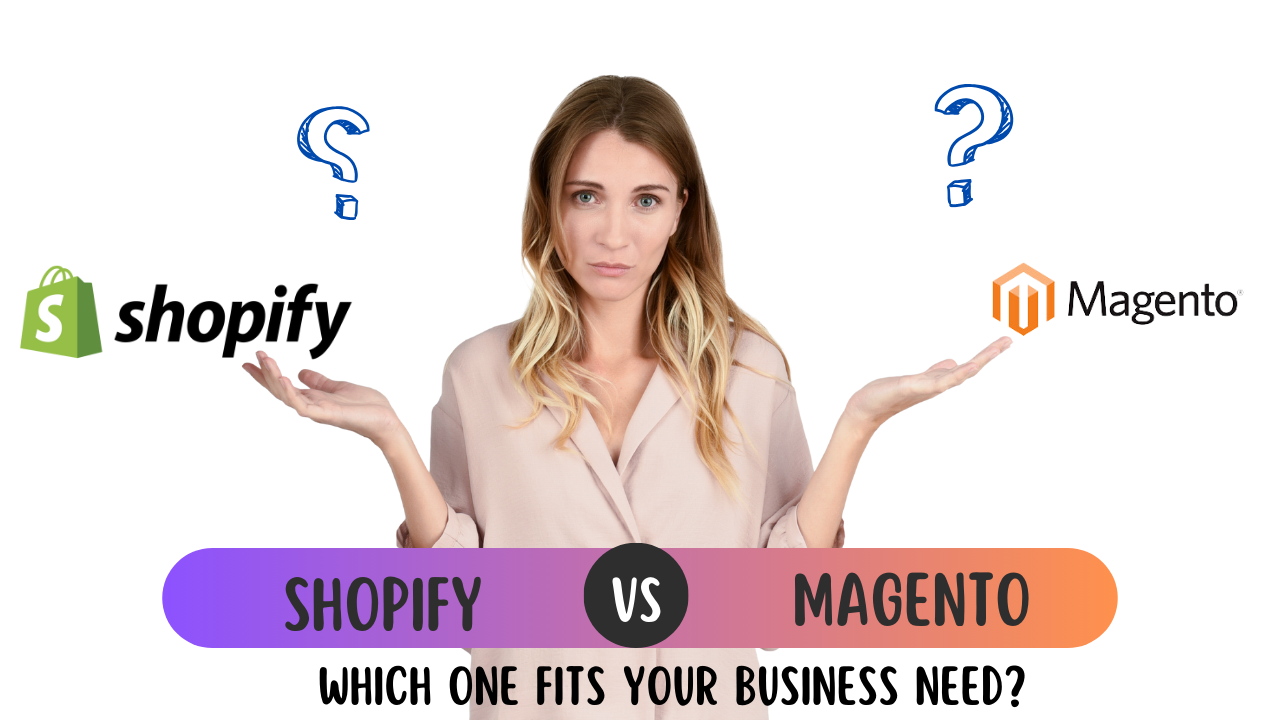When you’re setting up an online store, it’s important to pick the right platform. Two popular choices are Shopify and Magento. Let’s explore what these platforms are and why you should consider them for your online store.
Shopify:
What is Shopify?
Shopify is a user-friendly, hosted e-commerce platform that allows businesses to create and manage online stores without the hassle of dealing with technical complexities. It’s easy to use, and you don’t have to worry about the technical stuff because Shopify takes care of that. It offers a wide range of features, including:
- A user-friendly drag-and-drop interface for store creation and customization
- A vast library of themes and templates to match any brand
- A comprehensive suite of marketing and SEO tools
- 24/7 customer support
Key Features of Shopify:
- Ease of Use: Shopify is known for its simplicity and user-friendly interface. It’s an excellent choice for entrepreneurs who may not have extensive technical knowledge.
- App Ecosystem: Shopify has a vast ecosystem of apps and plugins that can enhance the functionality of your online store. This allows you to customize and extend your store’s capabilities according to your business requirements.
- Security and Reliability: Shopify takes care of security and hosting, ensuring that your online store is secure and reliable. This is particularly beneficial for small to medium-sized businesses that may not have dedicated IT resources.
- Payment Integration: Shopify supports a wide range of payment gateways, making it easy for customers to make purchases using their preferred payment methods.
Magento:
What is Magento?
Magento, on the other hand, is an open-source e-commerce platform that provides a high degree of customization and flexibility. It’s a self-hosted solution, giving businesses more control over their online store’s infrastructure and code.
Key Features of Magento:
- Customization: Magento is renowned for its high level of customization. It allows businesses to tailor their online stores to specific needs, making it suitable for larger enterprises with complex requirements.
- Scalability: Magento is highly scalable and can handle large product catalogs and high traffic volumes. This makes it an ideal choice for businesses with ambitious growth plans.
- Community and Support: As an open-source platform, Magento benefits from a large community of developers and users. This community support can be valuable for troubleshooting issues and accessing a wealth of resources.
- Multi-Store Functionality: Magento supports the creation of multiple stores from a single installation, which is beneficial for businesses operating in different regions or catering to diverse markets.
Why Consider Shopify?
Shopify is a great choice for businesses that:
- Are new to e-commerce and want an easy-to-use platform
- Have a smaller product catalog and don’t need advanced customization
- Value customer support and want a hands-off approach to store management
- Want to scale their business quickly and easily
Why Consider Magento?
Magento is a great choice for businesses that:
- Have a large product catalog and complex pricing structures
- Need advanced customization and control over their store
- Have a team of developers or are willing to hire one
- Anticipate high traffic and growth in their business
Choosing the Right Platform
The best e-commerce platform for your business will depend on your specific needs and goals. You can find it on Fiverr also. If you are a small business starting out, Shopify is a great option due to its ease of use and affordability. As your business grows, you can easily scale your Shopify store to accommodate your needs. If you are a larger business with complex requirements, Magento is a better choice due to its flexibility and customization power.
Why Merchants Prefer Shopify to Magento
Content Management System (CMS) Feature
Shopify offers a built-in CMS that enables online retailers to manage their blog effortlessly. The user-friendly editor allows for easy editing of headers, typeface, links, image insertion, and more. In contrast, Magento requires a third-party extension to establish a blog.
Unlimited Bandwidth
Shopify provides merchants with unlimited bandwidth and online storage on all plans, eliminating the need for separate setups.
First-party POS System
Shopify boasts a first-party POS system that seamlessly integrates with your online store, providing a comprehensive view of your business data. Magento, on the other hand, relies on Connect POS, a third-party POS system, for this functionality.
Trusted by Merchants
Shopify has gained the trust of millions of merchants, while Magento has over 250,000. Shopify’s support caters to businesses of all sizes, from small startups to enterprise-level organizations, fostering their growth on the platform.
SEO Best Practices
Shopify incorporates built-in SEO features, including meta descriptions, meta titles, and more, to optimize your website for search engines. Merchants can further enhance SEO by adding features through the Shopify App Store. Shopify’s CMS also enables the creation of blogs, which improves search engine rankings.
No Transaction Fees
While Magento doesn’t charge transaction fees directly, payment providers like Stripe add their own fees, such as 2.9% and £0.20 for non-European transactions and 2.4% + £0.20 for European transactions. Shopify Payments, available on all plans, eliminates transaction fees, making it a more cost-effective solution.
Affordable Dropshipping
Dropshipping is possible on both Shopify and Magento. However, Magento users must pay a $249 USD flat fee for the Dropship extension. Shopify offers various dropshipping options, including Oberlo, which provides a free plan for dropshipping without any monthly subscription fees.
Built-in Security
Shopify prioritizes security with built-in features like fraud analysis, SSL certificates, and PCI-DSS compliance. It also adheres to GDPR regulations. Magento requires manual installation of an SSL certificate, and PCI-DSS compliance is the merchant’s responsibility.
Built for All E-commerce Businesses
Magento is primarily designed for enterprise-level businesses, while Shopify caters to businesses of all sizes. Shopify’s scalable feature set ensures that you only pay for the features you need as your business grows.







Be First to Comment